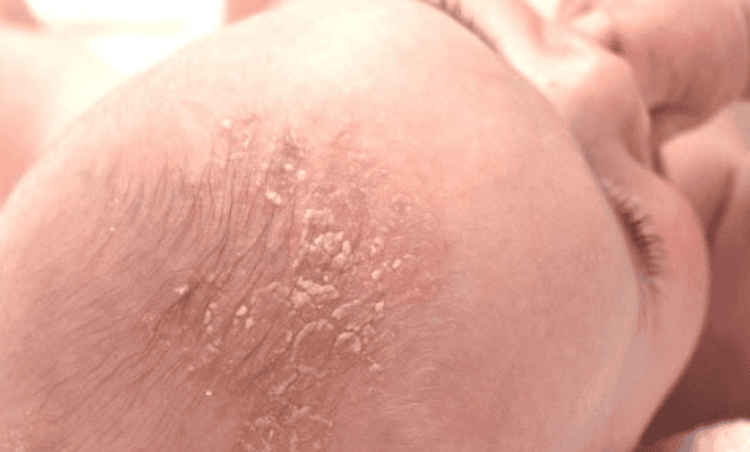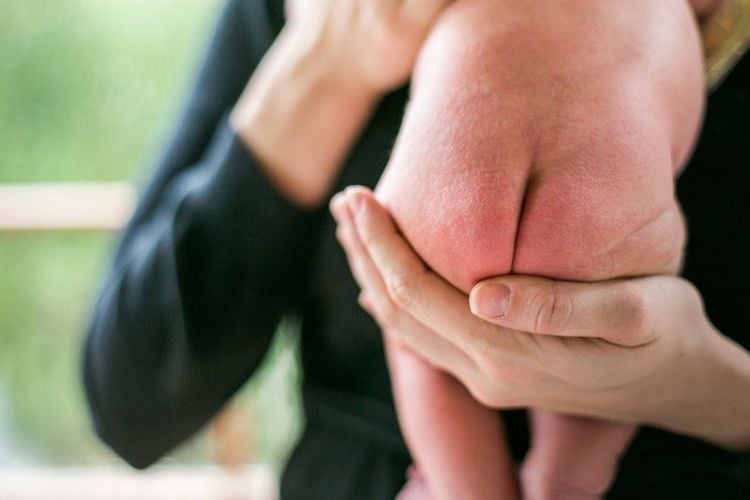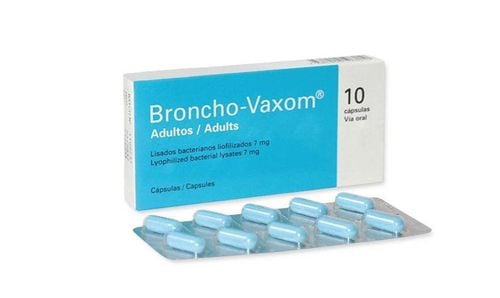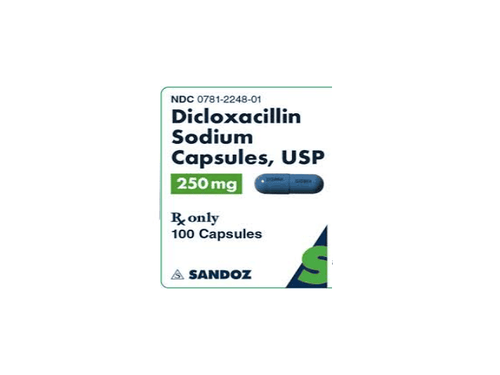This is an automatically translated article.
The article is professionally consulted by Master, Resident Doctor Dang Thi Ngoan - Pediatrician - Neonatologist - Department of Pediatrics - Neonatology - Vinmec Ha Long International Hospital.
Newborns with immature immune systems and weak resistance are susceptible to diseases. Most common diseases in babies are not life-threatening, but parents need to recognize and proactively handle them in time to avoid unfortunate consequences.
1. Respiratory-related diseases
1.1. Cold Symptoms: Difficulty breathing, wheezing, frequent sneezing, runny or stuffy nose; Causes: Colds, allergies due to weather or viruses, dust; Treatment: Clean and dress the child warm enough. Rub baby oil on the soles of your feet, breastfeed your baby a lot. If there is nasal discharge, it needs to be cleaned, so that the child sleeps with his head elevated to prevent the nasal discharge from flowing back in. 1.2. Hiccups Symptoms: Common when a baby is born, hiccups continuously, frequency about 3 times/day, 3 minutes each time; Cause: Involuntary and intermittent contraction of the diaphragm causes inhaled air to stop abruptly, the glottis suddenly closes; How to handle: Do not wait for the baby to be too hungry to feed, nor feed too full. After eating, the child should be held with his or her head high for easy digestion. Breastfeeding is also an effective cure for hiccups. If you see a child hiccups for a long time, showing signs of fatigue, you need to take them to the hospital. 1.3. Respiratory tract infections Symptoms: Fever, cough, runny/stuffy nose, wheezing. In severe cases, there may be shortness of breath, high fever, convulsions, cyanosis; Cause: Due to cold, air pollution or infection from other people; Treatment: Breastfeed your baby and take him to the doctor for a prescription. 1.4. Pneumonia Not only a common disease in infants, pneumonia is also a major cause of death in children under 1 year of age.Manifestations: There are no special signs in the early stages. Later, the baby sucks poorly or refuses to breastfeed, has a fever or hypothermia despite being warmed, lethargy, rapid breathing or difficulty breathing; Ways to prevent disease: Keep baby warm, breastfeed exclusively to increase resistance, keep hygiene to avoid bacterial infection; Treatment: Anti-respiratory failure and anti-infection depending on the degree of respiratory failure at the hospital.

Không chỉ là một bệnh thường gặp ở trẻ sơ sinh, viêm phổi còn là nguyên nhân chính gây tử vong ở trẻ dưới 1 tuổi
2. Skin diseases
Newborn skin is so thin and weak that even the slightest touch can cause problems.2.1. Jaundice This common illness in newborns is divided into 2 types:
Physiological Jaundice . It is usually caused by a build-up of too much bilirubin than the body excretes. Physiological jaundice is very common, occurring in most neonates.
Pathological jaundice Increases many areas of yellow skin, the baby has pale stools, possibly with an enlarged spleen. Various causes include: hemolysis, liver disease, biliary obstruction, infection. If the clinical jaundice does not go away after 3 days, the child must be taken to the hospital.
Recommended video:
Distinguish physiological neonatal jaundice and pathological jaundice
2.2. Milk acne Symptoms: Rare in newborns, but will appear several weeks later. Small acne grows a lot on cheeks, forehead, chin and back, the skin around is red. Acne increases when the baby's body is hot or exposed to drool, chemicals; Causes: Due to the thin and weak skin of the baby, the influence of the mother's hormones or the sebaceous gland hypertrophy syndrome; How to handle: Daily bathe your baby with clean, boiled, cooled water and gentle baby shower gel. After bathing, use a soft towel to dry your body. If the cystic acne does not go away after 3 months, you need to see a doctor. 2.3. Seborrheic dermatitis This is also a common disease in infants, known as "buffalo shit" in folklore.
Symptoms: Sticky greasy scales, concentrated on the top of the head or buttocks, appear in babies 2 weeks of age and older; Causes: Genetics, humid environment, or increased inflammatory response to the fungus Malassezia furfur; How to handle: Wash the baby's hair every time he bathes, can add baby mineral oil. Usually after 8 - 12 months, the "buffalo dung" scales will disappear on their own.

Viêm da tiết bã ở trẻ sơ sinh có thể do gen, môi trường ẩm ướt hoặc phản ứng viêm với vi nấm
Symptoms: Tiny blisters on face, arms, back, neck; Cause: Children sweat a lot but not all out. Heat rash will go away on its own when the child is cleaned and dressed in dry clothes.
2.6. Diaper rash Along with the popularity of diapers, diaper rash has also become one of the common diseases in babies and children.
Symptoms: Many levels, from redness, to blisters in the buttocks and groin area, causing a lot of pain to the child; Causes: Using diapers too much, too tight, poor hygiene; Handling: Limit the use of diapers, keep the baby's bottom and groin area dry. In addition, some other skin diseases are also common in babies including: rash, dermatitis, pale skin,...

Hăm tã là một trong số các bệnh phổ biến thường gặp ở trẻ sơ sinh
3. Digestive problems
Even if only breastfed, but the baby's immature digestive system can still have some problems such as:3.1. Vomiting, choking Symptoms: Usually in the first few months, babies after breastfeeding will spit out white, yellow or lumpy milk; Causes: Feeding the baby in the wrong position, lying down right after feeding, sucking too much. Some cases are caused by diseases such as malformations of the digestive tract, upper respiratory tract infections, poor intestinal motility... Treatment: Put the child on his or her side when vomiting and give first aid if choking. Refer to instructions for correct breastfeeding. 3.2. Diarrhea Diarrhea is one of the common diseases in infants, but it cannot be ignored.
Symptoms: Baby has more bowel movements than usual, the stools are loose and have a fishy smell, sometimes there is blood in the stools; Causes: The diet of a nursing mother has many cold dishes or the child has a gastrointestinal infection; Handling: Mothers do not eat a lot of seafood during breastfeeding. Breastfeed your baby more often to make up for the water lost in diarrhea. If your baby's diarrhea does not go away for 2 days, you need to go to the hospital immediately to avoid life-threatening. Diarrhea should be distinguished from the phenomenon of frequent bowel movements (dark green, odorless meconium) in 6-12 hours after birth and heavy stools 2-3 times/day, light stools can be more than 10 times when breastfed. This is a normal phenomenon, not a disease.
3.3. Constipation Symptoms: More than 1 day to go heavy once, solid stools, the baby has to push a lot; Cause: Because nursing mothers eat a lot of hot and spicy foods or babies use inappropriate formula; Handling: Mothers increase fiber intake (green vegetables, fruits), breast-feeding exclusively for the first 6 months. If you have to use formula milk, choose a cooler type.

4. Other common infant diseases
4.1. Thrush Symptoms: The tongue appears white patches or small sores that make children anorexic, stop feeding. When thrush spreads to the buccal mucosa, the roof of the mouth is painful; Cause: Fungal, bacterial or viral infection; How to handle: Do not abuse tools or thrush honey for children under 6 months old. Ask your doctor about antifungal agents to apply to your child. 4.2. Umbilical protrusion Symptoms: There is bulging tissue below the navel, the umbilicus is quite prominent, painless; Cause: Umbilical hernia, common in premature or low birth weight babies; How to handle: Usually self-healing when the baby is 1 year old. If the disease is more severe, the child should be taken to the hospital for examination. 4.3. Hemolysis Symptoms: Jaundice, prolonged anemia; Cause: Incompatibility between maternal and fetal blood types; Treatment: Amniocentesis during pregnancy for early detection. If there are signs of hemolysis, take the child to the hospital for a blood transfusion and treatment as soon as possible. 4.4. Weight loss in the first week after birth Symptoms: About 7-10 days after birth, babies can lose 6 - 10% of their weight despite being fully breastfed; Causes: Due to loss of water through the skin and frequent urination; How to handle: Continue to breastfeed your baby on demand. After this time, children begin to gain weight very quickly, about 1-1.2 kg/month, so there is no need to worry. 4.5. Asphyxiation Manifestations: Newborn babies can't catch their breath or breathe irregularly; Causes: Hypoxia, intracranial trauma, maternal-fetal immune incompatibility, intrauterine infection, fetal airway obstruction; Treatment: Get medical help right away. 4.6. Eye inflammation Symptoms: Double eyelids are swollen, red, watery, difficult or even impossible to open eyes... common when a baby is just a few days old; Cause: Infection from the mother's genital tract at birth (gonorrhea, chlamydia...), or from the womb (premature rupture of membranes) or because the baby is not cared for and cleaned well in the new days of birth; Treatment: Need to monitor, take care of the eyes and good hygiene of the child. If conjunctivitis is found, it must be treated immediately at the hospital to avoid affecting vision. Some other conditions such as babies leaning over, twisting, crying a lot, etc. are also very common.Common diseases in babies are usually due to weak resistance, some genetic. The best way to detect and treat early is regular ultrasound during pregnancy. After birth, the baby should be exclusively breastfed for at least the first 6 months of life. If a mother has problems with milk, she must find the right milk for her baby.
In order to prevent young children from contracting diseases in the hot season, parents should pay attention to a diet to improve children's resistance. At the same time, add supporting foods containing lysine, essential micro-minerals and vitamins such as zinc, chromium, selenium, B vitamins,... snacks and less digestive problems.
Parents can learn more:
Why do you need to supplement Lysine for your baby?
The role of zinc - Guidelines for reasonable zinc supplementation
Please visit the website Vinmec.com regularly and update useful information to take care of your baby and family.
Recommended video:
Allergic rhinitis and its treatment














